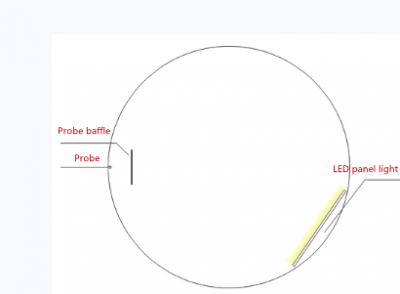Foreword:
With the rapid development of the LED industry, the application range of LED lamps is becoming wider and wider, and there are more and more types of lamps. Flat light is one of them. Flat light is suitable for indoor lighting such as living room, bedroom, corridor, kitchen, viewing balcony, etc. At the same wattage as traditional lighting sources, flat panel lights are energy efficient, have equal lumens, similar color temperatures, and high CRI.
At present, there are many integrating sphere-LED spectrum analyzers used in the test of flat lights on the market. Because of the different installation positions of flat lights in the integrating sphere, the test methods are also different, and because there are many kinds of flat lights in the integrating sphere. The installation method results in a large difference in the test results, and the maximum can be as much as 40%. Since there is no unified standard norm, they are all independent.
There are several methods for integrating spheres to test flat panel lights:

The first test method

The second test method

The third test method

The fourth test method

The fifth test method

The sixth test method
No matter which manufacturer’s equipment is adopted, the first solution will encounter the problem of lamp suspension, so the customer can consider the optional inner platform when purchasing the integrating sphere. LISUN’s new integrating sphere has a built-in reserved port, and only needs to add an inner platform. It can meet the placement problem of lamps and lanterns.
However, in the current market, it is not popular to use an integrating sphere to test flat panel lights, because the integrating sphere uses a 4π light source. If you test flat panel lights, it is recommended to use a goniophotometer for testing. The goniophotometer uses a 360-degree uninterrupted test angle. , to complete a full-space test of a 4π or 2π lamp, this method has no error in the influence of the lamp itself on the test environment, so the accuracy is higher than the integrating sphere.
Integrating sphere introduction:
The integrating sphere is a cavity sphere whose inner wall is coated with white diffuse reflective material, also known as photometric sphere, luminous flux sphere, etc. It required to connect with LISUN spectroradiometer and other equipment to test the luminous flux, color temperature, light efficiency and other parameters of the light source.
Conventional photometric integrating sphere:
When testing, the light source needs to be installed in the center of the integrating sphere. And the standard specifies the multiple relationship between the surface area of the inner wall of the integrating sphere and the surface area of the object to be measured. Therefore, buyers need to purchase an integrating sphere of suitable size according to the size of their samples.
Constant temperature integrating sphere:
For example, as a certification laboratory, the test environment needs to be strictly in accordance with the standard, that is, the test needs to be carried out in an environment with a constant temperature of 25 degrees Celsius. At this time, it is necessary to ensure that the internal temperature of the integrating sphere is constant at 25 degrees, but since the light source will also generate heat, a constant temperature integrating sphere is required to ensure that the internal temperature of the integrating sphere is constant. The constant temperature integrating sphere will be more expensive. However, it is not recommended for self-use customers to purchase thermostatic integrating spheres.
Applications:
The optical sphere works with a Spectroradiometer to do the photometry, colorimetry and radiometry parameters measurement.
• IS-0.3M/IS-0.5M is for LEDs, LED modules, mini LED bulbs & other small lamps. The flux testing range is 0.001 to 1,999 lm
• IS-1.0MA is for CFL or LED bulbs. The flux testing range is 0.1 to 199,990 lm
• IS-1.5MA/IS-1.75MA is for CFL, LED bulb and tube, fluorescent lamp, CCFL. The flux testing range is 0.1 to 1,999,900 lm
• IS-2.0MA is for HID lamps or high power lamps. The flux testing range is 0.1 to 1,999,900lm
Lisun Instruments Limited was found by LISUN GROUP in 2003. LISUN quality system has been strictly certified by ISO9001:2015. As a CIE Membership, LISUN products are designed based on CIE, IEC and other international or national standards. All products passed CE certificate and authenticated by the third party lab.
Our main products are Goniophotometer, Integrating Sphere, Spectroradiometer, Surge Generator, ESD Simulator, EMI Receiver, EMC Test Equipment, Electrical Safety Tester, Environmental Chamber, Temperature Chamber, Climate Chamber, Thermal Chamber, Salt Spray Test, Dust Test Chamber, Waterproof Test, RoHS Test (EDXRF), Glow Wire Test and Needle Flame Test.
Please feel free to contact us if you need any support.
Tech Dep: Service@Lisungroup.com, Cell/WhatsApp:+8615317907381
Sales Dep: Sales@Lisungroup.com, Cell/WhatsApp:+8618917996096
Your email address will not be published. Required fields are marked *